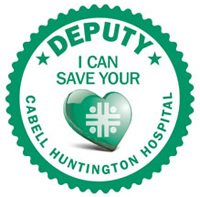Become a Heart Attack Hero
The Society of Cardiovascular Patient Care is conducting an Early Heart Attack Care (EHAC) campaign, which encourages early recognition of symptoms when they may be mild. For people experiencing these symptoms, the heart attack can be prevented with early treatment before any damage to the heart can occur!
 The children's component of the EHAC campaign is the Deputy Heart Attack Program. According to EHAC educator Katherine Cunningham, “Children are often overlooked as an important population to recognize a crisis and take action. Children live with adults who could very well be at risk, and they are often very sensitive to changes that adults may be quick to dismiss. By educating them about the early signs, children will be armed with the knowledge to know how to handle a situation if their parent, caregiver or another adult begins to show signs or symptoms of a heart attack.”
The children's component of the EHAC campaign is the Deputy Heart Attack Program. According to EHAC educator Katherine Cunningham, “Children are often overlooked as an important population to recognize a crisis and take action. Children live with adults who could very well be at risk, and they are often very sensitive to changes that adults may be quick to dismiss. By educating them about the early signs, children will be armed with the knowledge to know how to handle a situation if their parent, caregiver or another adult begins to show signs or symptoms of a heart attack.”
How Children Can Help
The faster that symptoms can be identified, the more beneficial treatment will be. About 85% of muscle damage takes place within the first hour of the heart attack. If children can recognize the symptoms in a grandparent or caregiver early and alert an adult or 9-1-1 immediately, less damage to the heart muscle occurs. Often, it’s not the heart attack itself that kills; it is the time that is wasted identifying the symptoms and deciding what to do.
What Children Need to Know
- Heart attacks have beginnings. The symptoms, which are shown at right, can begin about two weeks before a major heart attack. This is the best window of opportunity to prevent death and minimize heart damage.
- Heart attacks kill about 800,000 people each year in the US, but that number can be cut in half if everyone learns the signs and symptoms of an early heart attack.
- If you suspect someone is having a heart attack, be a good Samaritan and get them to medical care as soon as possible.
The Parents' Role
Discuss the signs and symptoms of an early heart attack as a family, so that each of you could potentially save a life. Once you feel that your child has mastered the information and has the maturity to act responsibly and independently, develop a contingency plan and teach your child what to do if it appears that someone is having a heart attack. The plan should include alerting an adult and/or calling 9-1-1. To make it easier for your child to dial, always refer to the emergency number as 9-1-1, rather than 9-11.
When your child has a complete understanding of the signs and symptoms, and knows what to do, it's time to take the oath:
Early Heart Attack Care Oath
I understand that heart attacks have beginnings that may include chest discomfort, shortness of breath and/or arm pain, and weakness. These may occur hours or weeks before the actual heart attack. I solemnly swear that if it happens to me or anyone I know, I will alert an adult or call 9-1-1.
Please present your child with this special certificate and offer congratulations on learning how to saving a life!
